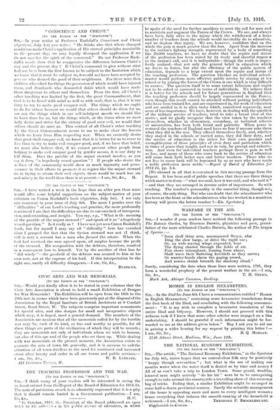[To THE EDITOR OP THE " SPECTATOR.") S,n, • --I have waited
a week in the hope that an abler pen than mine would offer some helpful suggestions on the subject-matter of your criticism on Canon Rashdall's book (Spectator, July 1st). I see only one comment in your issue of July 8th. The more I ponder over the " difficulties " of our Lord's teaching and practice, the more profoundly convinced I am that the difficulties are due to our own lack of interpreta- tion, understanding, and insight. You say, e.g., "What is the meaning of the parable of the unjust steward ?" and speak of it as "a hopelessly vexed question." Is it really so ? I have not yet seen Canon Rashdall's book, but for myself I may say all " difficulty " here has vanished since I grasped the fact that the Syrian steward was not (I think, still is not) a servant but a man who farmed the estate. When the lord had received the sum agreed upon, all surplus became the profit of the steward. His composition with the debtors, therefore, resulted in a consequent loss to himself. Yet by the sacrifice of that loss he " did wisely "—the goodwill of the debtors was secured to him at his own cost, not at the expense of his lord. If this interpretation be the right one, surely all difficulty disappears.—I am, Sir, &e.,
RUSTICUS.






























 Previous page
Previous page